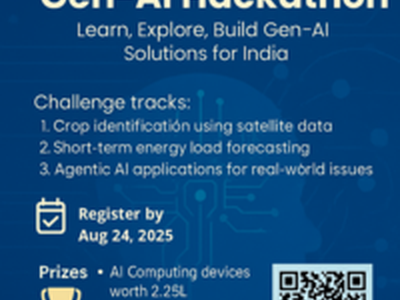

About the challenge The Centre for Networked Intelligence (CNI) at the Indian Institute of Science (IISc) is delighted to announce the IndiaAI Impact Gen-AI Hackathon, in partnership with IBM Research, India. The hackathon is sponsored by Cisco Corporate Social Responsibility and supported by IBM-IISc Hybrid Cloud Lab and IndiaAI Mission of the Ministry of Electronics and Information Technology. The objective of this hackathon is to spur the development of AI-driven solutions for the Indian context, harnessing the power of open-source technologies among Indian students. To help participants climb the learning curve swiftly, we will provide starter resources—online learning resources, boilerplate code, and datasets—powered by IBM. IBM offers many open-source tools to build Gen AI Solutions. These resources can help you with setting up data preprocessing pipelines, handling of unstructured data, creation of synthetic data towards fine-tuning, and running the fine-tuning process. The Agent Development Kit (ADK) can help with building Agentic Applications equipped with Gen AI models. Find out more at the hackathon challenge tracks below Who can participate? This hackathon is open to all college students currently enrolled in a full-time academic program in India. You can participate as an individual or as a team of up to three members. Note: We are not looking for volunteers to judge the hackathon. Getting Started: The hackathon involves four steps:
Registration of team members and team formation on DevPost (due Aug 24).
Submission of project proposals on DevPost (due Aug 30). The proposals will be reviewed for their merit by the jury, and only the selected proposals will proceed to the next stage.
Selected teams will receive an invite to a Kaggle workspace (due Sep 04).
Final solutions will need to be submitted on GitHub (due Sep 15)
1. Registration and team formation:
Click on the Join Hackathon button to register.
Form a team of 1-3 eligible students.
Team members must invite each other on Devpost to complete the team setup as part of the registration. All the team members are required to have a devpost account.
After the team formation is complete, every team must submit the proposal by 30th August 2025 (details below).
2. Proposal submission
After registration and team Formation, team members are required to make a common submission with the project proposal and details. Note: only the project proposal write-up is required as part of the devpost submission.
Any team member can edit their common submission of the proposal.
Please check the Requirements Section to know the details of the proposal submission. Your proposal acceptance depends on the completeness of the proposal.
Each team must choose only one track to participate in.
Make sure to study the Track Details below before deciding. You will not be permitted to change the track after proposal submission deadline is over.
3. Proposal approval and Kaggle invites
Keep an eye on your email for proposal acceptance, further instructions, and an invite to a track-specific Kaggle workspace
The team can start developing the solution once their proposal is accepted. The Kaggle workspace will provide documentation, boilerplate code, and datasets to get you started.
4. Final solution submission on GitHub
You will be invited to a GitHub classroom through the Kaggle dashboard.
Track Details: Track 1: Crop identification using satellite data Crop identification using satellite observations is an age-old problem and remains challenging, especially when trying to generalize model predictions across India's fragmented small farms with diverse cropping practices. This situation is different from regions like the USA or Europe, where farms are larger and practices are more homogeneous. Therefore, there is a significant opportunity to contribute by using geospatial foundation models as a backbone, fine-tuned with Indian native satellite observations and field-collected label data for a variety of crops. In this hackathon, the goal is to classify crop types in agricultural fields across Northern India using a combination of SAR and multispectral observations from Sentinel-1/EOS-4, ResourceSAT-2/2A, and Sentinel-2 satellites. Fields are located in various districts across the states of Uttar Pradesh, Rajasthan, Odisha, and Bihar. The AgriFieldNet India training dataset was originally generated by the Radiant Earth Foundation using ground reference data collection, and the IBM Research team enhanced it by adding SAR and optical observations from ISRO and EPA satellite sources. Track 2: Short-term energy load forecasting Accurate short-term load forecasting is crucial for decarbonizing buildings, which contribute about one-third of global energy use and emissions. This task focuses on forecasting and anomaly detection for energy consumption in commercial and residential buildings, supporting efficient energy management, renewable integration, and reduced reliance on fossil fuels. You will work with pre-trained Time Series Foundation Models (TSFMs) that learn generalizable temporal patterns across domains, enabling accurate forecasts and anomaly detection for new buildings without retraining. You can also fine-tune these models for specific building types or operational needs. Track 3: Agentic AI applications for real-world issues This track offers an opportunity to explore innovative use-case scenarios leveraging IBM's open-source technologies, including the Granite series of models, data preprocessing and preparation toolkits, performance benchmarks, and agent development frameworks. You are encouraged to propose end-to-end user scenarios that demonstrate complete automation workflows powered by Generative AI technology assets. This is your chance to showcase functional AI agents and articulate their end-value proposition through practical demonstrations. Consider drawing inspiration from India-centric scenarios where automation can address critical needs and deliver meaningful impact. IBM provides a comprehensive suite of technology assets (tech assets) and development tools, including the Agent Development Kit (ADK) for building agentic workflows.
Online
Centre for Networked Intelligence, IISc
₹ 0